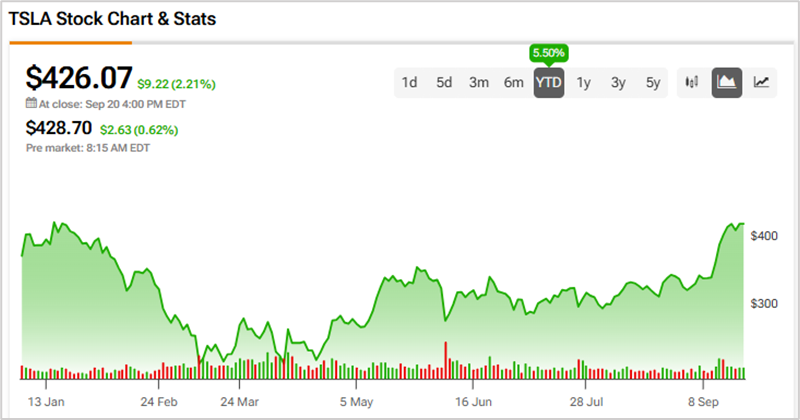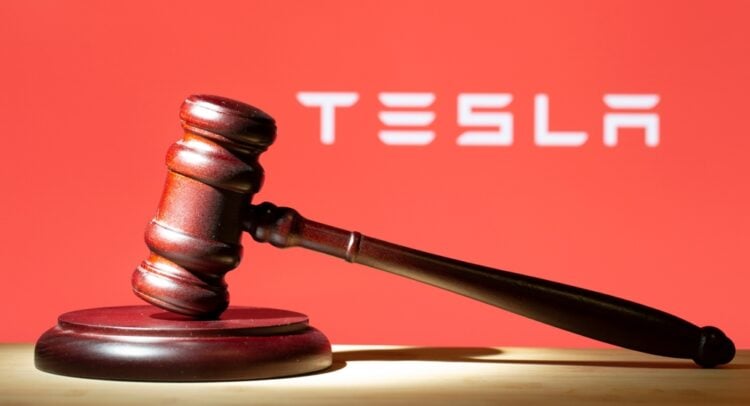A class action lawsuit was filed against Tesla (TSLA) by Levi & Korsinsky on August 4, 2025. The plaintiffs (shareholders) alleged that they bought TSLA stock at artificially inflated prices between April 19, 2023, and June 22, 2025 (Class Period) and are now seeking compensation for their financial losses. Investors who bought Tesla stock during that period can click here to learn about joining the lawsuit.
Meet Your ETF AI Analyst
- Discover how TipRanks' ETF AI Analyst can help you make smarter investment decisions
- Explore ETFs TipRanks' users love and see what insights the ETF AI Analyst reveals about the ones you follow.
Tesla, led by Elon Musk, is a global electric vehicle (EV) maker with China as its second-largest market. In June 2025, Tesla launched its Robotaxi service in Austin, Texas, deploying a small fleet of Model Y vehicles equipped with Full Self-Driving (FSD) software for autonomous ride-hailing within a geofenced area. The service is part of Tesla’s push into autonomous mobility, alongside its solar and battery business.
Tesla’s bold claims about its autonomous driving capabilities and the competitive positioning of its Robotaxi service are at the heart of the current complaint.
Tesla’s Misleading Claims
According to the lawsuit, Tesla and three of its current and/or former senior officers (the Defendants) repeatedly made false and misleading public statements throughout the Class Period. In particular, they are accused of omitting truthful information about the efficacy of Tesla’s autonomous driving technology, and the potential for dangerous or illegal operation of its autonomous driving vehicles (such as the Robotaxi), from SEC filings and related material.
For instance, during the Class Period, Tesla’s CEO kept reiterating the company’s autonomous driving capabilities and promises for the launch of its Robotaxi business. In an earnings call, Musk stated that “With Autopilot and FSD, we’ve now surpassed 150 million miles driven using the FSD beta, and that number is growing rapidly.” He added that the data gives Tesla a unique advantage that no one else has, and anyone familiar with AI would know how critical data is for training and achieving strong results.
Additionally, in an earnings call held on July 23, 2024, Musk noted that the company has made strong progress on FSD in Q2, and with version 12.5 rolling out, customers should see a major improvement in supervised driving performance.
Finally, in another earnings call dated January 29, 2025, the CEO noted that Tesla planned to launch unsupervised Full Self-Driving as a paid service in Austin in June. The Tesla team was confident about starting the initial rollout with no driver in the car.
However, subsequent events (detailed below) have revealed that the defendants overstated the effectiveness of Tesla’s autonomous driving technology.
Plaintiffs’ Arguments
The plaintiffs maintain that the defendants deceived investors by lying and withholding critical information about the company’s business practices and prospects during the Class Period. Importantly, the defendants failed to inform investors about a substantial risk that the company’s autonomous vehicles, including the Robotaxi, could operate unsafely or fail to comply with traffic laws.
The information became clear on June 23, 2025, when Bloomberg reported on a Tesla event held in Houston the day before. The report noted that Tesla’s self-driving taxis appeared to break traffic laws on their first day of paid rides, including one incident of a faulty left turn and others where cars went over the speed limit.
Furthermore, Bloomberg reported that the U.S. National Highway Traffic Safety Administration (NHTSA) contacted Tesla about the incidents, stating it was aware of the videos shared on social media and was seeking more information from the company. Following the news, TSLA stock kept declining for a couple of trading sessions, losing over 13% between June 23 and July 1.
To conclude, the defendants failed to inform investors about the potential risks associated with Tesla’s Robotaxi business and the likelihood that the company would face heightened regulatory scrutiny. Despite these issues, TSLA stock has gained 5.5% so far this year.

















